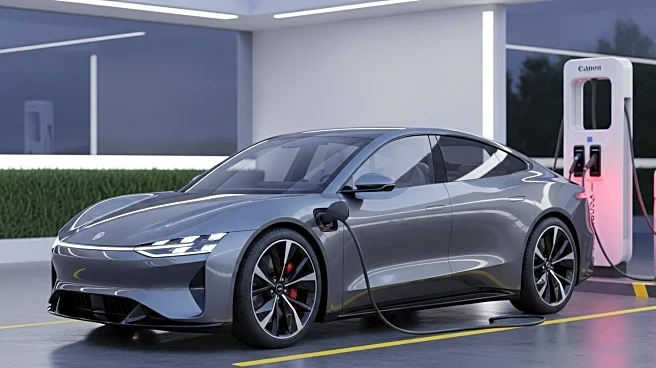What is the story about?
What's Happening?
Nissan has introduced the 2026 model of its Leaf electric vehicle, featuring significant upgrades aimed at strengthening its position in the EV market. The new Leaf boasts an all-new, EV-specific chassis and offers a driving range of 303 miles, which is a substantial improvement over previous models. The base price is set at $29,990, making it a competitive option for consumers looking for affordable electric vehicles. This development comes as Nissan seeks to bolster its EV lineup and regain market share in the increasingly competitive electric vehicle sector.
Why It's Important?
The introduction of the 2026 Leaf is crucial for Nissan as it attempts to solidify its presence in the electric vehicle market. With a longer range and competitive pricing, the Leaf is positioned to attract a broader customer base, potentially increasing Nissan's market share in the EV sector. This move is part of Nissan's strategy to innovate and adapt to the growing demand for sustainable transportation options. The success of the Leaf could have significant implications for Nissan's financial performance and its ability to compete with other major automakers investing heavily in electric vehicles.
What's Next?
Nissan is likely to focus on marketing the 2026 Leaf to highlight its improved features and affordability. The company may also explore partnerships or incentives to boost sales and expand its customer base. As the EV market continues to grow, Nissan will need to ensure that its production capabilities can meet demand and maintain quality standards. Additionally, the company may consider further innovations in battery technology and charging infrastructure to enhance the appeal of its electric vehicles.
Beyond the Headlines
The launch of the 2026 Leaf could influence broader industry trends, encouraging other automakers to prioritize affordability and range in their EV offerings. This shift could accelerate the transition to electric vehicles, contributing to environmental sustainability goals. Moreover, Nissan's focus on an EV-specific chassis may set a precedent for future vehicle designs, emphasizing the importance of tailored engineering solutions in the EV market.
















